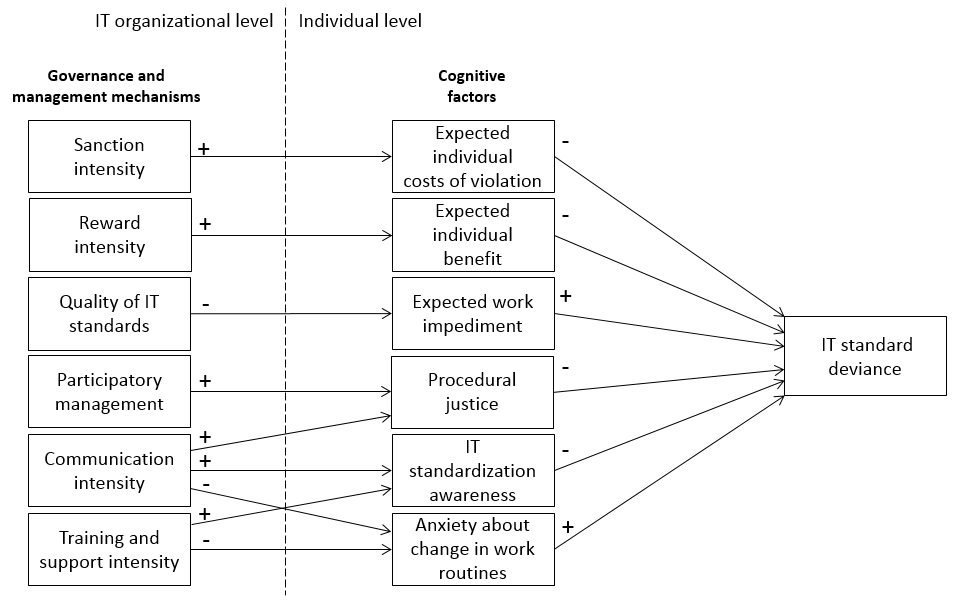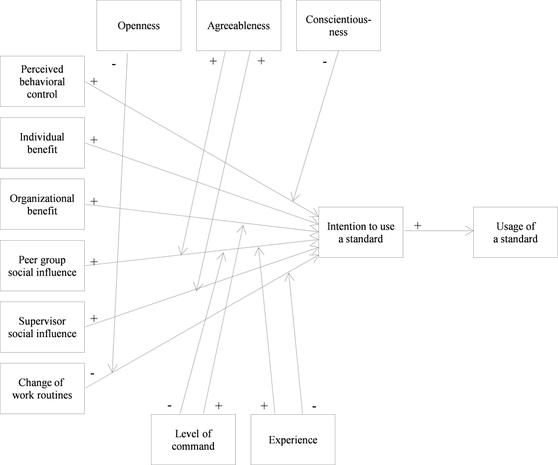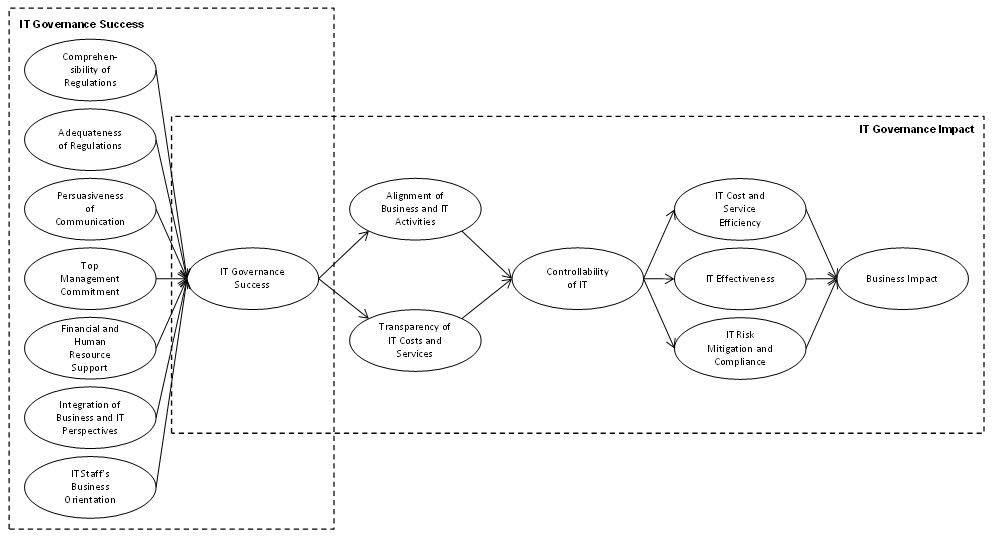|
Organizational information technology (IT) standards have become increasingly important for companies. However, insights from practice indicate that employees tend to violate these standards, generating a need for governance and management mechanisms with which to successfully implement them in the organization. The literature reveals a lack of research on organizational IT standards’ governance. The aim of a recent research project was to idenity the individual and organizational factors that influence an employee’s deviant behavior towards organizational IT standards. We therefore derived a conceptual multi-level model deductively from the literature, which we supplemented with an interview study. Conceptual Model of IT Standard Deviance
Our work enriches IS research and practitioner bodies of knowledge. We do so by first extending our knowledge of an employee’s deviant behavior towards organizational IT standards. Second, we provide valuable insights for organizations by providing starting points to improve their standardi-zation efforts. The research results have recently been accepted for publication: Dittes, S., Urbach, N., Ahlemann, F., Smolnik S. and Müller, T. (2015) Why don’t you stick to them? – Understanding factors influencing and counter-measures to combat deviant behavior towards organizational IT standards, Proceedings of the 12. Internationale Tagung Wirtschaftsinformatik (WI 2015), March 4-6, Osnabrück, Germany. (Link)
1 Comment
Standardizing organizational information technology (IT) infrastructure and processes is stated as one of the most important activities of today’s companies. Since IT is used and embedded in more and more business areas within companies, the complexity and costs of organizational IT infrastructures and processes are continuously rising. In this context, IT standardization represents a possible means to reduce complexity and maintain control over the organizational IT. Given the practical importance of organizational IT standards and standardization efforts, we carried out a database-driven literature search. We found that research on the management, governance and enforcement of IT standards within organizations is relatively limited. Previous studies indicate that many standardization efforts fail suffering from low acceptance rates among staff and rather superficial use Therefore, it is essential for companies to implement management and governance mechanisms to enforce the usage of IT standards in order to achieve their standardization goals. However, before designing such management mechanisms, it is important to first understand the drivers of employee’s acceptance towards organizational IT standards – because without having a deep understanding of employee’s acceptance behavior towards organizational IT standards, it is not possible to design efficient management mechanisms in order to raise the acceptance rate. Therefore it is especially important to understand the cognitive drivers from an employee’s perspective. The aim of a recent research project was to discover the most important influential factors from an employee’s perspective when it comes to accepting or rejecting organizational IT standards by building a perception-based model. Since our work seeks for explaining employee’s acceptance towards organizational IT standards, we embedded our study in the acceptance research stream by deriving a first understanding of the phenomenon. Building on this knowledge, we designed a field study approach based on interviews, resulting in a conceptual model that explains IT standard acceptance on an individual level. Individual Drivers of IT Standard Acceptance
Our work has a twofold contribution: First, we advance the research field on organizational IT standards by establishing links to the field of acceptance research and offering explanations for individual acceptance of those standards. Second, our developed model serves as a basis for managing organizational IT standardization. The research results have recently been accepted for publication: Müller, T., Dittes, S., Ahlemann, F., Urbach, N. and Smolnik, S. (2015) Because Everybody is Different: Towards Understanding the Acceptance of Organizational IT Standards, Proceedings of the 48th Annual Hawaii International Conference on System Sciences (HICSS-48), January 5-8, Kauai, Hawaii. (Link) Today, organizations increasingly use and depend on information technology (IT) to achieve their business objectives. The use of IT is grained through an amalgam of organizational, technical, and cultural influences. Effective IT governance (ITG) is required to orchestrate this mixture, which has become an important issue in both academic research and organizational practice. Despite its popularity, the ITG notion remains vague. The term ITG has been widely used by many parties, such as IT managers, consultants, auditors, and software providers, for various aspects of corporate IT management. Practitioners’ perceptions of ITG objectives, properties, and responsibilities thus appear as unclear and heterogeneous as they do in the literature. In addition, comprehensive knowledge of the factors influencing ITG success and its subsequent impact in terms of a unifying model is scarce. Existing practitioner guides do provide helpful advice, but are often not generalized from specific implementations, display limited rigor, and do not provide sufficient explanation of the cause-effect relationships. Furthermore, previous academic research has only provided studies on individual ITG success determinants and consequences. However, none of these studies combine ITG success determinants and consequences into a comprehensive and integrated model of ITG success and its impact. In a recent research project, we addressed two research objectives accordingly: (1) understanding the factors that influence and result from successful ITG, and (2) integrating these factors into a model that explains ITG success and its impact. Given the rather limited theoretical body of knowledge that underpins ITG success research, we followed a qualitative-explorative approach. We conducted 25 interviews in 19 companies across different industries, analyzed and interpreted the collected data by applying extensive content analysis, and compared our findings with prior research results. Aggregating what we learned from the 25 interviews, we propose a model that describes how the various observed constructs are interrelated and how they contribute to or result from successful ITG. Model of IT Governance Success and Impact Our results contribute to research on ITG by providing a model that explains how ITG should be designed in order to be successful and what the organizational impact of successful ITG will be. Our research identified several constructs and relationships that are strongly supported by empirical evidence, some of which previous research has not investigated. Practitioners will benefit from this model, because it enables them to better set up and develop ITG, as well as to understand and promote its potential impact.
The research results have recently been accepted for publication: Urbach, N., Buchwald, A. and Ahlemann, F. (2013) Understanding IT Governance Success and its Impact: Results from an Interview Study, Proceedings of the 21st European Conference on Information Systems (ECIS 2013), June 5-8, Utrecht, The Netherlands. (Link) |
Archives
December 2015
Categories
All
|



 RSS Feed
RSS Feed